#agilecertification
Explore tagged Tumblr posts
Text
Your Agile Journey Starts Here – PMI-ACP® Certification with Learnovative
🚀 Become a Certified Agile Professional with PMI-ACP® 🚀
Ready to accelerate your Agile career? Join Learnovative’s PMI-ACP® Certification Training and gain the skills top companies are looking for!
✅ Learn Agile principles & frameworks
✅ Master Scrum, Kanban, Lean, XP & more
✅ Get expert training aligned with PMI standards
✅ Boost your credibility and earning potential
🎯 Ideal for Project Managers, Agile Coaches, and Scrum Masters
📅 Limited seats available – Enroll now!
📍 Live Virtual Sessions | Interactive Learning
📞 Call : 09949994949
#PMIACP#AgileCertification#LearnAgile#Scrum#Kanban#PMICertification#ProjectManagement#Learnovative#AgileTraining#CareerGrowth#CSM#CSPO#ACSM#ACSPO#CSMtraininginHyderabad#CSMtrainingcoursesinHyderabad#ScrumMastertraininginHyderabad#ScrumMastercertificationinHyderabad#CertifiedScrumMastercertificationinHyderabad#CertifiedScrumMastercertificationtraininginHyderabad#CSMcertificationinHyderabad#CertifiedScrumTrainerinHyderabad#CertifiedAgileScrumTrainerinHyderabad#CertifiedEnterpriseCoachinHyderabad#CertifiedTeamCoachforCSMinHyderabad#CertifiedTeamCoach#CSPOinHyderabad
0 notes
Text
Safe Agilist Training and Certification Explained Everything You Need to Know
Introduction :-
In an increasingly dynamic digital era, businesses are doing everything possible to produce value more quickly, evolve more rapidly, and innovate at scale. The Scaled Agile Framework (SAFe) has become the go-to solution for scaling Agile methods throughout enterprises. At the center of this revolution is the SAFe Agilist (SA) certification—a credential that enables professionals to drive Agile transformations and business agility.
What Is SAFe Agilist Training and Certification?
The SAFe Agilist (SA) is a certified expert with knowledge in implementing and working with the Scaled Agile Framework at the enterprise level. The process starts with the "Leading SAFe" course—a broad, 16-hour training designed for leaders and managers. The course addresses Lean-Agile principles, SAFe roles, business agility competencies, Lean Portfolio Management, DevOps, and continuous delivery.
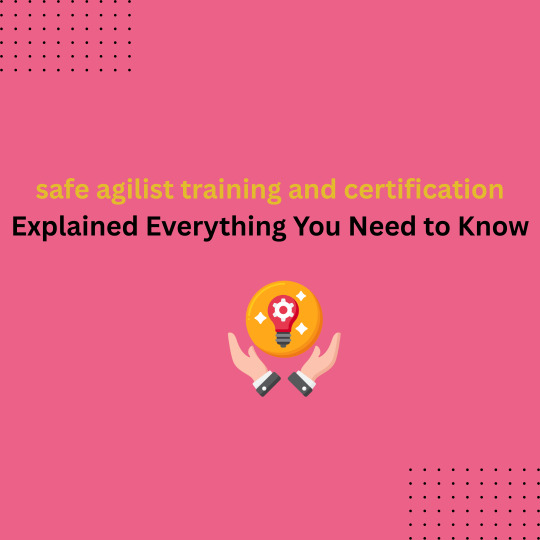
Once completed, candidates take the SAFe Agilist training and certification exam, which examines their knowledge of SAFe principles and their capacity to apply them to real-world situations. The certification is awarded by Scaled Agile, Inc., the world leader in SAFe.
Why Should You Get SAFe Agilist Certified?
Future-Proof Your Career SAFe Agilist certification is widely accepted internationally and reputed across industries. It unlocks global opportunities and makes you different in a competitive employment market.
Improve Your Earning Capacity Certified SAFe individuals tend to earn 25% more than their non-certified counterparts, with mean salary raises of as much as $13,000 and access to positions having up to $150,000 or more per year.
Drive Organizational Transformation SAFe Agilists take the lead in leading enterprises through Agile transformation, process optimization, and continuous improvement culture.
Master New Roles and Skills The certification allows you to acquire the leadership, collaboration, and management skills required to accelerate Agile adoption at scale. You'll learn to align across-functional teams, prioritize portfolios, and consistently deliver value.
Minimize Obstacles and Failures With hands-on experience in Lean-Agile practices, SAFe Agilists enable organizations to minimize delays, failures, and misalignments in Agile implementation.
Step-by-Step: How to become a SAFe Agilist
Meet the Prerequisites: It's advisable to possess at least five years of experience in software development, product or project management, or business analysis, and a good grasp of Agile and Scrum.
Complete the Leading SAFe Course Take the two-day (16-hour) instructor-led training, which teaches all major SAFe concepts and readies you for the certification exam.
Prepare for the Exam: Review course material, practice exams, and interactive sessions to solidify your learning.
Pass the SAFe Agilist Exam: The exam is 45 multiple-choice questions that are to be answered in 90 minutes. A passing score is necessary to be certified.
Maintain Your Certification Remain engaged with the SAFe community, continue to learn on an ongoing basis, and recertify as needed by Scaled Agile, Inc.
Trending Benefits for 2025
International Accreditation: Work globally with ease using a credential accepted by leading employers.
Continuous Delivery & DevOps: Acquire knowledge in combining DevOps for repetitive, high-quality deliveries.
Customer-Centric Innovation: Master how to apply Lean Startup and Lean UX for accelerated experimentation and innovation.
Leadership at All Levels: Learn and master new and emerging Agile roles in your company.
Conclusion SAFe Agilist certification is not just a designation—it's the door to leading Agile transformations, opening global doors, and delivering actual business outcomes. As companies will continue to scale Agile in 2025, SAFe Agilists will lead the wave of change, able to deliver value, create innovation, and future-proof their careers. Ready to alter your career and your organization? Begin your SAFe Agilist journey today.
Visit Us:- https://www.simpliaxis.com/us/leading-safe-certification-training
Mail id :- [email protected]
Read More :-
SAFe Agilist Certification Process in 2025: Steps & Details
How to Choose the Best SAFe Certification for Your Career?
#SAFeAgilist#AgileCertification#LeanAgile#BusinessAgility#SAFe2025#AgileLeadership#ScaledAgile#FutureOfWork#Safe certification#Leading Safe#certificationtraining#careergrowth
0 notes
Text

🚀 Boost Your Career with Agile Scrum Foundation Certification Training! 🚀
Are you a software developer, project manager, or IT professional looking to enhance your skills in Agile project management and Scrum frameworks? Upgrade My Skill's Agile Scrum Foundation Certification Training is your perfect gateway to understanding Agile principles and Scrum practices.
📚 What You'll Learn:
Key concepts of Agile methodologies. Scrum roles, events, and artifacts. Agile planning, estimating, and continuous improvement techniques. Practical applications of Agile tools and best practices. This entry-level course is designed to prepare you for the Agile Scrum Foundation (ASF) Certification Exam. Delivered in both classroom and live online modes, it's accessible to professionals worldwide.
✅ Why Get Certified?
Increase Career Opportunities: Stand out with a globally recognized credential. Boost Earning Potential: Agile expertise is in high demand across industries. Lead Successful Projects: Master the tools and techniques to drive iterative progress and enhance team performance. Get ready to elevate your career and become an Agile expert with Upgrade My Skill!
👉 Enroll Now: https://www.upgrademyskill.com/agile-scrum-foundation-certification-training
#AgileScrum#ScrumCertification#ProjectManagement#UpgradeYourSkills#AgileTraining#careerdevelopment#AgileMethodology#ScrumMaster#AgileProjectManagement#AgileCertified#ScrumTraining#ProfessionalDevelopment#AgileCertification#ProjectManagementTraining#AgileScrumFoundation#ScrumPractices#ITProfessionals#SoftwareDevelopment#AgileCoaching#ScrumMasterCertification#AgileTeams#ContinuousImprovement#CareerGrowth#ITTraining#AgileSkills#AgileProcess#ScrumRoles#UpgradeMySkill#CertificationTraining#AgileExperts
0 notes
Text
PSM Certification: Your Ultimate Guide to Achieving PSM1 Certification Online
Introduction to PSM Certification
Agility has evolved from a buzzword to a need in today's fast-paced and constantly changing corporate environment. Agile approaches are being adopted by businesses all around the world in order to increase output, boost customer happiness, and maintain competitiveness. Scrum is one of the most well-known frameworks in the Agile space, and becoming certified as a Professional Scrum Master (PSM) can greatly advance your career in Agile project management. We'll go over all you need to know about psm certification, its advantages, and how to get your PSM1 certification online in this extensive tutorial.
What is PSM Certification?
The PSM certification, provided by Scrum.org, is an internationally accepted qualification that attests to a person's comprehension of Scrum concepts and their proficiency with Scrum methods. Project managers, Scrum Masters, Agile coaches, and everyone else working with the Agile method can all benefit from the qualification. PSM I (PSM1 certification) is the foundational level of the PSM certification, which is separated into three levels: PSM I, PSM II, and PSM III.
Why Pursue PSM Certification?
Improved Career Opportunities: As Agile approaches are used more widely, there is a growing need for qualified Scrum professionals. Gaining a PSM certification can help you progress in your career and find new employment.
Validation of Skills: Obtaining a PSM certification will help you become more credible in the eyes of colleagues and employers by formally recognizing your proficiency with Scrum.
Enhanced Team Performance: You can efficiently lead Scrum teams, foster cooperation, and guarantee that projects are finished on time if you are a qualified Scrum Master.
Global Recognition: Scrum.org is a well-known Agile community organization, and its certifications are accepted all around the world.
Understanding PSM1 Certification
Scrum.org offers the PSM1 certification as its entry-level certification. It concentrates on the essentials of Scrum, such as its tenets, roles, activities, and artifacts. Obtaining PSM1 certification certifies your grasp of and proficiency with Scrum in practical contexts.
Exam Details: There are 80 multiple-choice questions in the PSM1 exam, which is an online, open-book test.
Duration: The exam will take 60 minutes to finish.
Passing Score: A minimum score of 85% is required to pass the exam.
Exam Fee: The PSM1 certification exam is $150 USD in cost.
Exam Subject Matter
Several subjects are covered in the PSM1 exam, such as:
The Scrum framework, its empirical nature, and the significance of Scrum values are all explained in Scrum Theory and Principles.
Scrum Roles: The Development Team, Product Owner, and Scrum Master's duties.
Scrum Events: Daily Scrum, Sprint Planning, Sprint Review, and Sprint Retrospective goals and procedures.
Scrum Artifacts: The Product Backlog, Sprint Backlog, and Increment's importance.
Scrum Implementation: Putting Scrum into Practice in Various Project Scenarios.
Preparing for PSM1 Certification Online
In order to pass the PSM1 certification exam, candidates must have a solid grasp of Scrum techniques and concepts. The following actions will assist you in properly preparing:
1. Examine the Scrum Guide.
The canonical source for understanding Scrum is the Scrum Guide, written by Jeff Sutherland and Ken Schwaber, the other co-creators of Scrum. It offers a clear and thorough synopsis of the Scrum framework. It is necessary to read and comprehend the Scrum Guide in order to pass the PSM1 exam.
2. Enroll in an Online Program
Structured learning and professional advice can be obtained by enrolling in an online PSM1 course. PSM certification courses with interactive quizzes, practice examinations, and video lectures are available on numerous online platforms. These classes can help you study for the test and solidify your grasp of Scrum principles.
3. Work on your skills using sample questions
You can become more accustomed to the exam style and pinpoint your areas of weakness by practicing with example questions and mock exams. PSM1 practice tests that mimic the real exam are available for both free and paid use on a number of websites and online discussion boards.
4. Attend study forums and groups
Engaging in study groups and online discussion boards can offer insightful advice and encouragement from other PSM1 candidates and certified Scrum experts. Participating in conversations, posing queries, and exchanging experiences can improve your confidence and comprehension of Scrum.
5. Examine Extra Resources
Think about looking through books, articles, and videos about Scrum and Agile approaches in addition to the Scrum Guide. "Scrum: The Art of Doing Twice the Work in Half the Time" by Jeff Sutherland and "Scrum Mastery: From Good to Great Servant-Leadership" by Geoff Watts are two books that are highly recommended.
Taking the PSM1 Exam Online
The option to take the PSM1 certification exam online is one of the major benefits of seeking the certification. The following advice will help you have a great online exam experience:
1. Make Sure Your Internet Connection Is Stable
To finish the online test without any disruptions, you must have a reliable internet connection. Before beginning the test, make sure your internet connection is dependable and fast.
2. Select a Calm Setting
Locate a peaceful, distraction-free space to complete the exam. To prevent interruptions, let your roommates or family members know when your exams are scheduled.
3. Prepare the Resources You'll Need
Organizing and easily available resources, like the Scrum Guide, notes, and reference materials, is crucial even though the PSM1 test is open-book.
4. Effectively Manage Your Time
Time management is essential when you have 60 minutes to complete 80 questions. Take your time reading each question and try not to spend too much time on one particular one. If you can't decide on an answer, venture a guess and carry on.
Maintaining and Advancing Your PSM Certification
It's crucial to keep studying and developing your Scrum expertise after receiving your PSM1 certification. The following are some strategies to keep and improve your certification:
1. Acquire Real-World Experience
Using Scrum principles in practical projects will help you become more knowledgeable and proficient. Look for opportunities to participate in Scrum methods and work on Agile projects.
2. Go for More Advanced Certifications
To indicate your advanced understanding of Scrum and to further authenticate your experience, think about obtaining higher-level Scrum certifications like PSM II and PSM III.
3. Participate in Scrum Conferences and Events
Attending Scrum conferences, workshops, and events will help you stay current on best practices and the newest developments in Agile and Scrum while also offering excellent networking opportunities.
4. Participate in Expert Communities
Joining groups and communities dedicated to Scrum can offer possibilities for collaboration with other Scrum practitioners as well as continuous support and resources.
Conclusion For individuals seeking to succeed in Agile project management and Scrum methodologies, obtaining PSM1 certification is a noteworthy accomplishment. By earning this widely accepted certification, you can show that you are dedicated to ongoing development and that you are capable of leading and facilitating Scrum teams. A great route to professional development and job advancement is the PSM certification, regardless of whether you're new to Scrum or want to confirm what you already know. You have the freedom to start this journey at your own speed and convenience by taking the psm1 certification exam online. With PSM certification, you may start your preparation now and open the doors to a lucrative Agile career.
#PSMCertification#PSMOnline#PSM1Certification#ScrumMaster#Agile#Scrum#AgileCertification#ProjectManagement#ProfessionalScrumMaster
0 notes
Photo

What is the Customer Agility Framework ™ The Customer Agility Framework ™ is an evolution upon the Agile Manifesto rather than the existing Agile Frameworks. It contains contains two missing links in agile organizational #AgileWorldInc #AgileTransformation #AgileFinOps #LeanPortfolioManagement https://agile-world.us/what-is-the-customer-agility-framework/?utm_source=tumblr&utm_medium=%23AgileWorld&utm_campaign=%23AgileWorld
#AgileCertification#AgileWorldInstitute#AgileWorldFramework#BusinessNorthStar#Community#ContinuingProfessionalDevelopment#CustomerAgility#CustomerAgilityFramework#CustomerNorthStar#Insights
0 notes
Text
Master Integrated Scrum in No Time
With work and life taking all your attention and focus, you need a training program that gives you the core concepts and best practices in a clear, concise way. In busy life schedule, you need applicable skills that you can put into practice immediately to boost your career. Master the techniques of Integrated Scrum framework so you can deliver products efficiently. Get a competitive edge to become a Scrum expert in no time flat.
What Is Integrated Scrum Training?
Integrated Scrum training is an agile framework for completing complex projects. Scrum focuses on collaborative, cross-functional teams and iterative development.
The Scrum Team
The Scrum team includes the product owner, Scrum master, and development team members. The product owner representsthe customer's perspective and holds the responsibility for steering the vision and prioritizing features. The Scrum master facilitates the Scrum process and eliminates barriers. The development team undertakes the tangible tasks of designing, developing, and testing.
Scrum Ceremonies
Sprint planning, daily standups, sprint reviews, and sprint retrospectives are the elementary steps. In sprint planning, you determine and priorities the tasks. Daily 15-minute standup meetings help keep the team in sync and coordination. In the sprint review, the completed tasks are demonstrated to the stakeholders. Retrospectives evaluate the sprint to plan improvements.
The Sprint
The sprint, typically lasting 1-4 weeks, lies at the core of Scrum. The team emphasizes on completing a prioritized set of features within the designated sprint period. Short sprints foster adaptability to changes and optimize productivity. Altering priorities or introducing new tasks during the sprint are avoided.
Key Values
In Scrum, some essential values include commitment, courage, focus, openness, and respect. Team members pledge to accomplish sprint goals. Courage enables the team to hold one another accountable. Focus involves prioritizing tasks and avoiding distractions. Openness and respect foster trust among team members, fostering an environment where issues can be raised without fear of blame.
Integrated Scrum training covers all facets of Scrum, enabling successful implementation within your organization. Through practice, the Scrum framework empowers teams to achieve heightened productivity, adaptability, and quality.
The Key Benefits of Integrated Scrum Training
The Scrum framework maximizes teamwork and focuses on value-adding activities, enabling efficient and effective completion of complex projects. Integrated Scrum training assists individuals and organizations in implementing Scrum practices for optimal outcomes.
Master Scrum Methodology
Understanding Scrum theory and values provides insights into its effectiveness and proper application. Learning Scrum artifacts, events, and roles helps build high-performing teams capable of quick responses to change. With practice, Scrum becomes ingrained.
Increase Productivity and Quality
Scrum enhances transparency, inspection, and adaptation, elevating team productivity. Daily scrums, retrospectives, reviews, and planning ensure team alignment and allow for adjustments. Early issue identification minimizes wasted effort and rework, resulting in higher-quality outcomes.
Empower Teams
Scrum empowers teams with autonomy and flexibility, fostering innovation. Collaborative decision-making guides achievement of Sprint goals and delivery of potentially shippable product increments. Teams self-organize, with the Scrum Master facilitating. End-to-end responsibility and accountability are embraced by team members.
Adapt to Change
Scrum's iterative approach accommodates changes in requirements or priorities. Short Sprints facilitate integration of new information into subsequent Sprints. Plans can be revised and backlog reprioritized without disrupting ongoing work. Scrum's flexibility enables organizations to thrive in dynamic, fast-paced environments.
How to Get Started With Integrated Scrum Training
It is crucial to understand the methodology and underlying principles. Integrated Scrum merges Scrum, Extreme Programming (XP), and Lean methodologies for a flexible framework for software development. The key principles are as follows:
Focus on individuals and interactions
Integrated Scrum emphasizes on motivated team members who communicates closely, collaborating in paired programming, and providing continuous feedback. Teams are self-organizing and cross-functional, with members assuming different roles as necessary.
Embrace change
Integrated Scrum teams operate in short goals called “Sprints”, typically lasting 1-2 weeks, to develop usable software increments. Requirements can evolve from sprint to sprint based on customer feedback, facilitating flexibility and adaptability.
Deliver working software
Early and frequent delivery is essential. Each sprint yields a functional product increment that can be showcased to stakeholders. This approach minimizes wasted effort and ensures alignment with customer needs.
Collaborate closely
Programmers collaborate in pairs, maintaining constant communication and reviewing each other's code. This practice disseminates knowledge across the team and results in higher quality code.
Initial training session must be conducted based on the methodology, roles, and processes. Then, kick off Defining a product vision, followed by prioritization of product backlog. Conduct sprint planning for the first 1-2 week sprint. Scrum meetings encourage pair programming among developers, and solicit regular feedback from stakeholders.
Conclusion
Implementing Integrated Scrum may necessitate substantial organizational and procedural adjustments. However, by prioritizing individuals, embracing change, delivering functional software increments, and fostering close collaboration, Integrated Scrum teams can efficiently and effectively develop high-quality, customer-centric products.
0 notes
Text
Embracing Project Success with PRINCE2 Agile Practitioner Certification
Introduction:
In the dynamic landscape of project management, where change is constant and adaptability is key, professionals are constantly seeking methodologies that seamlessly integrate structure and flexibility. PRINCE2 Agile Practitioner is a certification that has emerged as a powerful solution, marrying the best practices of PRINCE2 with the agility of Agile methodologies. In this blog, we'll explore the significance of PRINCE2 Agile Practitioner and how it empowers project managers to navigate the complexities of modern project environments.
Understanding PRINCE2 Agile Practitioner:
PRINCE2 (PRojects IN Controlled Environments) is a widely recognized project management framework, providing a structured approach to project management. On the other hand, Agile is known for its iterative and flexible approach, fostering collaboration and adaptability. PRINCE2 Agile Practitioner bridges these two worlds, offering a comprehensive framework that combines the structure of PRINCE2 with the agility of Agile methodologies.
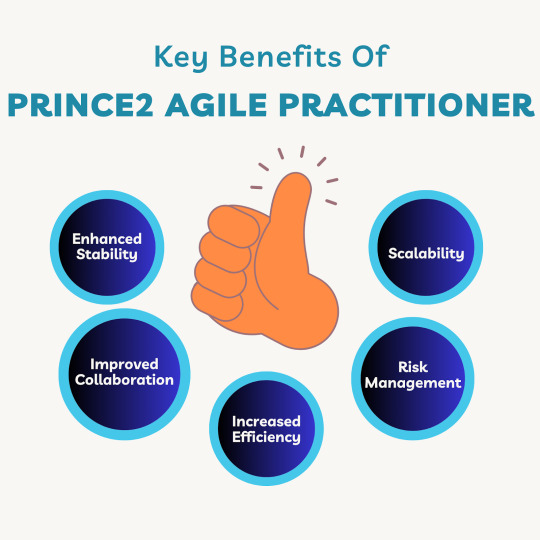
Key Benefits of PRINCE2 Agile Practitioner:
1. Enhanced Adaptability:
PRINCE2 Agile Practitioner equips project managers with the tools to embrace change effectively. The framework allows for iterative development and frequent feedback loops, ensuring that the project remains aligned with evolving stakeholder expectations.
2. Improved Collaboration:
Agile methodologies emphasize collaboration, and PRINCE2 Agile Practitioner takes this principle to heart. The framework encourages open communication, cross-functional teams, and a collaborative mindset, fostering an environment where team members work together seamlessly.
3. Risk Management:
PRINCE2 is renowned for its robust risk management processes, and PRINCE2 Agile Practitioner builds upon this foundation. The framework integrates risk management techniques from both PRINCE2 and Agile, ensuring that potential issues are identified and addressed proactively.
4. Scalability:
Whether you're managing a small project or a large-scale program, PRINCE2 Agile Practitioner is scalable to meet the needs of diverse projects. This adaptability makes it a versatile choice for project managers working in various industries.
5. Increased Efficiency:
By combining the best practices of PRINCE2 and Agile, PRINCE2 Agile Practitioner streamlines project processes, reducing inefficiencies and unnecessary overhead. This leads to faster delivery of value to stakeholders.
Steps to Attaining PRINCE2 Agile Practitioner Certification:
Foundation Level Certification:
Before pursuing PRINCE2 Agile Practitioner, individuals must first attain the PRINCE2 Foundation certification. This provides a foundational understanding of the PRINCE2 framework.
Agile Training:
Familiarize yourself with Agile methodologies through training courses such as Scrum, Kanban, or AgilePM. This knowledge will be valuable in applying Agile principles within the PRINCE2 context.
PRINCE2 Agile Practitioner Training:
Enroll in a PRINCE2 Agile Practitioner training course. This comprehensive training program will delve into the intricacies of combining PRINCE2 and Agile methodologies.
Examination:
Successfully pass the PRINCE2 Agile Practitioner exam, demonstrating your understanding of how to apply both PRINCE2 and Agile principles to real-world project scenarios.
Conclusion:
PRINCE2 Agile Practitioner certification is a powerful asset for project managers navigating the complexities of today's ever-changing project environments. By seamlessly blending the structure of PRINCE2 with the flexibility of Agile methodologies, this certification empowers professionals to lead projects with adaptability, collaboration, and efficiency. Embrace the future of project management with PRINCE2 Agile Practitioner and elevate your ability to deliver successful projects in any industry.
0 notes
Text
Popular Agile Software Development Methodology- Review and Analysis

Popular Agile Software Development Methodology
In Popular Agile Software Development Methodology, the Agile methodology stands out as a guiding light of innovation and efficiency. Agile Software Development Methods have revolutionized how teams approach projects, emphasizing adaptability, collaboration, and iterative progress. In this blog, we’ll undertake a comprehensive review and analysis of Agile methodologies, exploring their impact on the industry.
Understanding the Agile Software Development Life Cycle (SDLC):
The Agile SDLC is characterized by its iterative and flexible approach, fostering continuous adaptation to changing project requirements. Unlike traditional, linear models, Agile prioritizes collaboration, customer feedback, and rapid development cycles.
Planning:
Agile planning is dynamic and responsive. Teams work closely with stakeholders to define project requirements and prioritize tasks. Short-term goals are set, allowing for adjustments as the project progresses.
Execution:
Development occurs in short cycles, or sprints, promoting continuous integration and testing. This iterative process allows for the incorporation of feedback and adjustments, enhancing overall project adaptability.
Review:
Regular reviews, often conducted at the end of each sprint, provide crucial feedback loops. Stakeholders and development teams assess progress, identify areas for improvement, and adjust objectives for upcoming iterations.
Exploring Agile Software Development Frameworks:
Several frameworks have evolved to implement Agile principles effectively, with Scrum, Kanban, and Extreme Programming (XP) being among the most prominent.
Scrum:
Scrum is widely adopted for its structured framework. Roles such as Scrum Master and Product Owner facilitate communication, and the emphasis on fixed-length iterations ensures a steady pace of progress.
Kanban:
Derived from lean manufacturing, Kanban visualizes workflow on a board, making it easier to track progress and identify bottlenecks. This approach prioritizes efficiency and continuous delivery.
Extreme Programming (XP):
XP emphasizes close collaboration between developers and stakeholders, promoting continuous testing, frequent releases, and a commitment to simplicity. It is a holistic approach to Agile development.
Diverse Agile Development Methodologies:
Beyond frameworks, various Agile development methodologies tailor Agile principles to specific organizational needs.
Scrum Methodology:
Beyond its role as a framework, Scrum is often considered a distinct Agile methodology.
It encourages teamwork, flexibility, and a commitment to ongoing enhancement.
Crystal Methodologies:
In Crystal methodologies, the emphasis is on valuing people and their interactions more than relying solely on processes and tools.
They vary in complexity based on project needs, emphasizing the human element in development.
Feature-Driven Development (FDD):
FDD is an iterative and incremental methodology centered around building features.
Regular inspections ensure alignment with business objectives.
The Agile Paradigm Shift:
Agile methodologies signify a paradigm shift from rigid, document-driven approaches to a more dynamic and responsive development culture. By fostering collaboration, embracing change, and prioritizing iterative progress, Agile methods offer businesses a framework for success in the modern digital landscape.
Agile Software Development with Grey Space Computing:
As businesses navigate the intricacies of Agile software development, having a knowledgeable and experienced partner is crucial. Grey Space Computing stands as a leader in Agile software development services, offering expertise in various Agile methodologies and frameworks. Whether your project aligns with Scrum, Kanban, or other Agile approaches, we tailor our services to meet your unique requirements.
Conclusion:
In the realm of software development, Agile methodologies have emerged as a driving force for success. Embracing adaptability, collaboration, and continuous improvement, Agile offers a roadmap for navigating the complexities of modern projects. Grey Space Computing, with its commitment to innovation and proficiency in Agile practices, stands ready to be your partner in this transformative journey. Unlock the true potential of Agile software development by reaching out to Grey Space Computing today.
#agiledevelopment#agile methodology#agilecertification#agile development#agile project management#Popular Agile Software Development Methodology
1 note
·
View note
Text
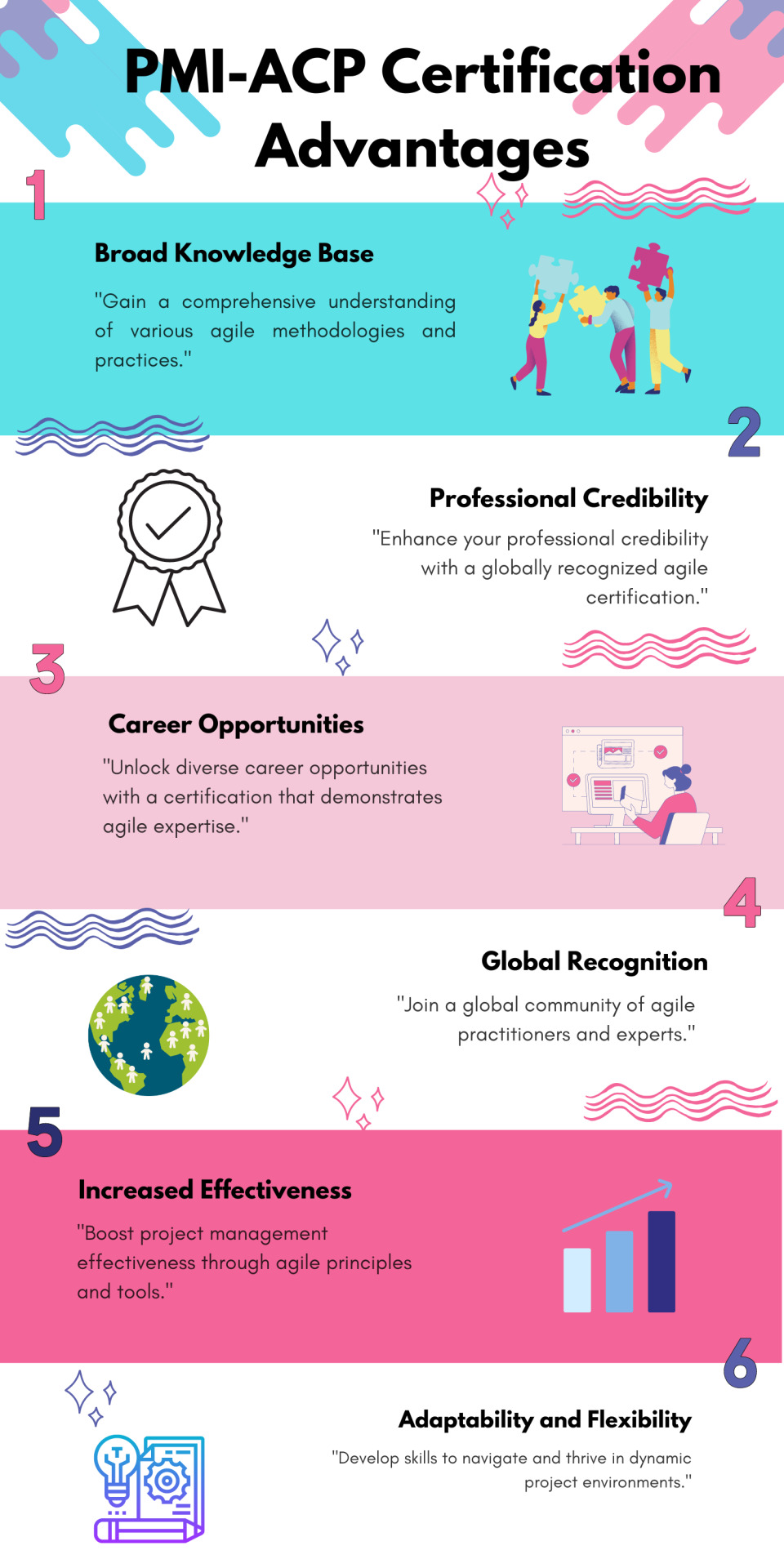
🚀 Elevate your project management game with PMI-ACP! 🌐✨ Explore the world of Agile methodologies and boost your career prospects. 🏆🔗 Dive into comprehensive agile practices and join a global community of agile practitioners. 🌍💡 Ready to take the next step? Learn more about PMI-ACP certification now! 🎓🚀
0 notes
Text
Unifying Excellence: The Crucial Role of PMP Certification in Agile Project Management
Introduction:
The combination of traditional project management practices and Agile methodologies in a dynamic project management environment has been a hallmark of success Project Management Professional (PMP) certification, a globally recognized standard, plays an important role in skilled project managers they are installed. This blog explores the relationship between PMP certification and agile business management, and shows how this combination is a force for delivering successful services in today’s fast-paced business environment.
Understanding PMP Certification:
The PMP certification by the Project Management Institute (PMI) is a prestigious certification that certifies a project manager’s knowledge and expertise in traditional project management practices It covers many aspects of project management, including project management a broad range of aspects, including initiating, planning, executing, managing, managing and completing projects.
The Agile Revolution:
On the other hand, agile project management is an iterative and incremental approach. It emphasizes flexibility, collaboration and customer satisfaction through consistent product delivery. Agile methodologies such as Scrum and Kanban have gained a reputation for their ability to adapt to changing business requirements and deliver value in a recursive customer-centric manner.

The Synergy:
The connection between PMP certification and agile project management lies in the flexibility and versatility that PMP-certified professionals bring to the table. Here is how PMP certification supports Agile practices:
1. Comprehensive Project Management Knowledge:
PMP certification provides professionals with a comprehensive understanding of project management principles. This knowledge builds a strong foundation that can align with the Agile process, ensuring that Agile projects are executed in the broader context of effective project management.
2. Integration of Traditional and Agile Practices:
Individuals who have achieved PMP certification have the ability to seamlessly integrate agile methodologies with traditional project management practices. This integration ensures that project teams can leverage the benefits of Agile while maintaining governance, risk management and stakeholder engagement.
3.Effective Communication and Stakeholder Management:
The PMP certification emphasizes communication with stakeholders, which are critical elements in the success of Agile projects. Agile relies heavily on collaboration and customer feedback, and PMP-certified professionals excel at managing stakeholder expectations and encouraging effective communication strategies.
4.Risk Management and Adaptability:
Risk management processes replete with PMP certifications align with Agile’s focus on transformation. PMP certified project managers are adept at identifying and mitigating risks, ensuring that Agile projects can quickly respond to change without compromising quality or timeline.
5. Professional Development and Continuous Improvement:
PMP certification requires continuous professional development through the accumulation of Professional Development Units (PDUs). This commitment to continuous improvement fits well with the Agile principle of thinking about performance and adapting for future iterations.
Conclusion
In an ever-changing project management landscape, a symbiotic relationship between PMP certification and agile processes is inevitable. Professionals with PMP certification bring a wealth of knowledge and skills to Agile projects, ensuring a balanced and effective approach to project management. As organizations increasingly embrace agile practices, the role of PMP certification in enhancing strategic and business process agility becomes even more apparent, creating a powerful link to business success in transformation and challenges faced.
0 notes
Text
🚀 Ready to take your Product Ownership skills to the next level
Join the Certified Scrum Product Owner (CSPO) Certification with expert Trainer Vijay Bandaru at Learnovative – your trusted destination for agile success!
✅ Learn from real-world case studies
✅ Boost your career with a globally recognized certification
✅ Gain practical insights into Agile, Scrum roles & Product Backlog management
📅 Limited slots available – Book now and transform your career with Learnovative!
�� Call: 09949994949
#CSPO#ScrumProductOwner#VijayBandaru#Learnovative#AgileCertification#ScrumTraining#ProductOwner#ScrumMaster#CareerGrowth#CSM#ACSM#ACSPO#CSMtraininginHyderabad#CSMtrainingcoursesinHyderabad#ScrumMastertraininginHyderabad#ScrumMastercertificationinHyderabad#CertifiedScrumMastercertificationinHyderabad#CertifiedScrumMastercertificationtraininginHyderabad#CSMcertificationinHyderabad#CertifiedScrumTrainerinHyderabad#CertifiedAgileScrumTrainerinHyderabad#CertifiedEnterpriseCoachinHyderabad#CertifiedTeamCoachforCSMinHyderabad#CertifiedTeamCoach#CSPOinHyderabad
0 notes
Text
Unleashing Agile Excellence: A Comprehensive Guide to PMI-ACP Certification
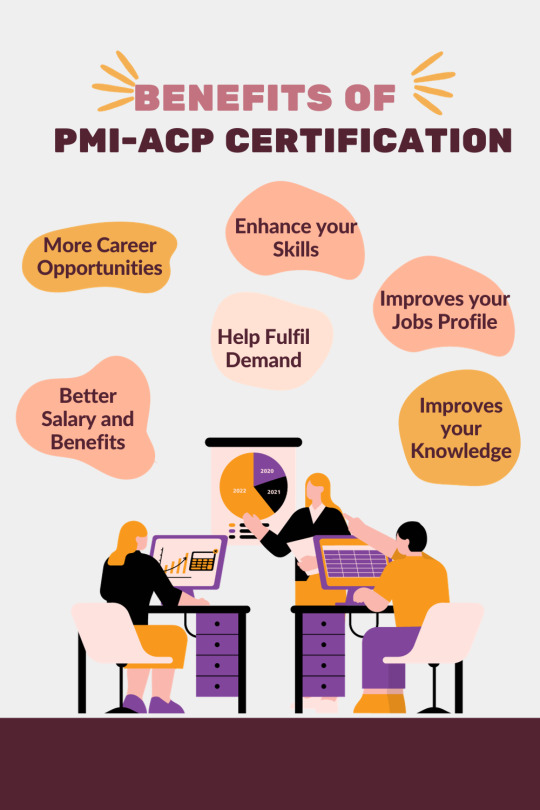
Introduction
Being agile is now essential in the ever-changing field of project management. Experts are using Agile approaches in order to prosper in a world where change and uncertainty are constant. The PMI Agile Certified Practitioner (PMI-ACP) certification is one of the primary certifications that attests to proficiency with Agile methods. We'll go into the world of PMI-ACP in this blog, looking at its importance, the certification procedure, and the advantages it provides.
Recognizing PMI-ACP:
The Project Management Institute (PMI) offers a credential called PMI-ACP, or Agile Certified Practitioner. It is intended for professionals who wish to demonstrate their mastery of Agile methods and principles. The certification covers a broad spectrum of Agile approaches, such as test-driven development (TDD), extreme programming (XP), Scrum, Kanban, Lean, and so forth. Those who obtain the PMI-ACP certification show that they are capable of managing projects with Agile methodologies.
Procedure for Certification:
Qualifications: Candidates must have completed 21 contact hours of Agile practice training in addition to having a secondary degree (high school diploma, associate's degree, or the worldwide equivalent) in order to be eligible for PMI-ACP certification. As an alternative, applicants with a bachelor's degree or above may still be eligible.
Application for Exam: Applicants must send in an application outlining their training in Agile methodology and experience managing projects. After reviewing the application and approving it, PMI gives instructions on how to set up the exam.
Exam Format: There are 120 multiple-choice questions on Agile tools and techniques, knowledge and skills, and Agile processes in the PMI-ACP exam. Three hours are allotted for the exam.
Sustaining Certification: In order to keep their PMI-ACP certification, professionals must get 30 professional development units (PDUs) in Agile subjects every three years.
Advantages of Certification in PMI-ACP:
Thorough Agile Knowledge: Certified practitioners are well-versed in a variety of techniques because PMI-ACP addresses a wide range of Agile methodology. This adaptability is crucial for meeting the demands of various projects.
Employment Advancement: By demonstrating a professional's dedication to Agile techniques, the PMI-ACP certification expands employment options. Project managers, Scrum Masters, product owners, and other team members working on Agile projects will especially benefit from it. Worldwide Acknowledgment:
The PMI-ACP certification offers professionals a respectable credential that is accepted all around the world. For people exploring international career options or employed by multinational corporations, this recognition is quite beneficial.
Conclusion
A person's dedication to become an expert in Agile methods is demonstrated by their PMI-ACP certification. Project management agility is an essential talent in a corporate environment that is changing quickly. Professionals can demonstrate their competence and establish themselves as leaders in the field of Agile project management by earning the PMI-ACP certification. Whether you're a seasoned project manager or hoping to take on a leadership position, PMI-ACP provides a route to Agile practice excellence and a career booster in the dynamic field of project management.
0 notes
Text
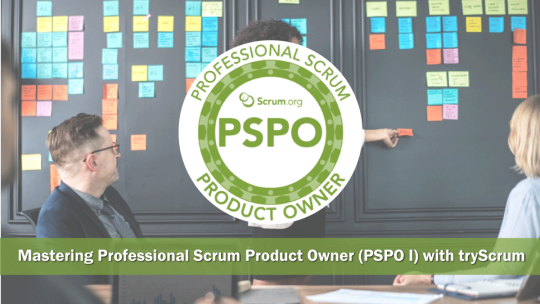
Professional Scrum Product Owner (PSPO I).
0 notes
Text
PMI-ACP: Unlocking the Power of Agile with PMI-ACP Certification
Agility is more than simply a trendy term in today's fast-paced, constantly-changing corporate world; it is a need. Agile approaches are being used by businesses all over the world to improve their responsiveness and adaptability, stay competitive, and provide value to their clients. The PMI Agile Certified Practitioner (PMI-ACP) certification is one of the many Agile certifications that is offered; it is a strong certification that attests to a professional's proficiency with Agile methods. This blog explores the value of the pmi acp certification, as well as its advantages, requirements, and effects on professional advancement.
Understanding PMI-ACP Certification
The PMI-ACP certification was created by the Project Management Institute (PMI) in response to the increasing need for Agile project management knowledge. A person's understanding of Agile concepts and practices across a range of Agile approaches, including as Scrum, Kanban, Lean, Extreme Programming (XP), and Test-Driven Development (TDD), is acknowledged by the PMI-ACP certification.
The PMI-ACP Certification: Why Select It?
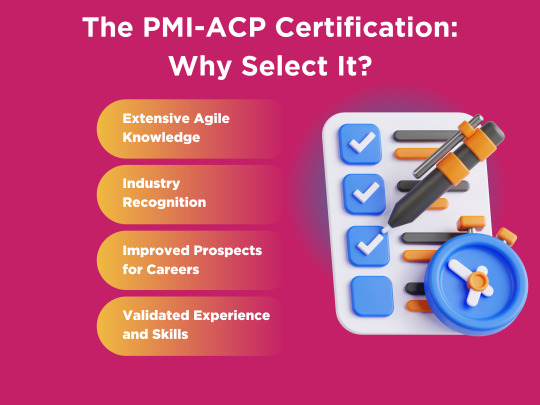
Extensive Agile Knowledge: The PMI-ACP offers a comprehensive grasp of Agile practices by covering a wide range of Agile techniques, in contrast to other Agile certifications that could concentrate on a specific methodology.
Industry Recognition: PMI is a well-known organization throughout the world, and its certifications are held in high regard in a variety of sectors. A professional's dedication to Agile methodologies and superior project management is demonstrated by their PMI-ACP certification.
Improved Prospects for Careers: Organizations are looking for experts who can manage Agile projects well as the use of Agile grows. Opportunities for employment as an Agile Coach, Scrum Master, Product Owner, and Project Manager are made possible by holding the PMI-ACP certification.
Validated Experience and Skills: To ensure that certified professionals have practical skills, the PMI-ACP certification process requires candidates to have real-world Agile project experience.
The Journey to Becoming a PMI Agile Certified Practitioner
There are multiple processes involved in obtaining the PMI-ACP certification, starting with fulfilling eligibility requirements and finishing the certification exam. This comprehensive handbook will assist you in navigating this path.
Qualifiability Standards
Prior to submitting an application for PMI-ACP certification, candidates need to meet the requirements listed below:
2,000 hours of general project experience working in project teams are required of candidates. The last five years should have included this experience. This criterion is not applicable if you currently hold a certification as a Program Management Professional (PgMP)® or Project Management Professional (PMP)®.
Agile Project Experience: Candidates must have 1,500 hours of experience working on Agile project teams or using Agile methodology in addition to general project expertise. This encounter needs to have happened in the last three years.
Agile techniques Training: Applicants are required to finish 21 contact hours of training in Agile techniques. Agile classes, workshops, and other official educational initiatives can help achieve this.
The Procedure for Applications
Application Submission: Using the PMI website, candidates must submit an online application describing their project experience and Agile methodology training.
Application Review: In order to confirm the candidate's eligibility, PMI examines the application. Up to ten business days may pass during this process.
Payment: Upon approval of the application, candidates must pay the examination cost. Exam fees are discounted for PMI members.
Exam Scheduling: Following payment, candidates may choose to take an online proctored exam or schedule their exam at a Pearson VUE testing facility.
The PMI-ACP Test
An examination of a candidate's knowledge and comprehension of Agile techniques and principles is the PMI-ACP exam. There are 120 multiple-choice questions on the test, and you have three hours to do it. Seven areas of Agile practice are covered by the questions:
Agile Delivery Value-Driven Delivery Principles and Mindset
Adaptive Planning, Stakeholder Engagement, Team Performance
Problem Identification and Fixing
Constant Enhancement (People, Process, and Product)
Candidates should study the PMI-ACP Exam Content Outline and suggested reference resources in great detail in order to get ready for the test. Additionally, applicants can become more accustomed to the format and question types of the exam by taking practice exams and simulated tests.
Benefits of PMI-ACP Certification
Obtaining the PMI-ACP certification has several advantages for people and businesses alike.
Individuals Looking to Advance Their Career: Possessing the PMI-ACP certification enhances a professional's marketability to employers and raises the likelihood of career progression.
Greater Earning Potential: Agile professionals with certifications frequently fetch higher compensation than their non-certified colleagues. Better job offers and wage negotiations may result from holding the PMI-ACP certification.
Enhanced Knowledge and Skills: To successfully complete the certification process, candidates must acquire in-depth understanding of a variety of Agile practices and processes. This will improve their capacity to manage Agile projects.
Possibilities for Networking: By joining PMI, professionals can connect with a large number of qualified practitioners, providing a platform for professional development, cooperation, and mentoring.
For Organizations
Better Project Outcomes and Increased Customer Satisfaction: PMI-ACP certified experts bring a thorough understanding of Agile principles and practices.
Enhanced Responsiveness and Flexibility: Agile approaches encourage responsiveness and rapid change adaptability. Businesses with PMI-ACP certified personnel are better able to adapt to shifting consumer demands and market conditions.
Enhanced Team Collaboration: Agile methodologies place a strong emphasis on cooperation and teamwork. A collaborative work atmosphere can be fostered by PMI-ACP certified workers, which will increase team productivity and performance.
Competitive Advantage: By investing in PMI-ACP certified professionals, organizations may deliver projects more effectively and efficiently, giving them a competitive edge in the market.
Real-World Impact of PMI-ACP Certification
The success of organizations as well as individual careers are significantly impacted by the PMI-ACP certification. Several real-world instances are as follows:
Case Study: XYZ Corp.'s Project Management Transformation: One of the top software development companies, XYZ Corp., has trouble finishing projects on schedule and on budget. The company's project delivery significantly improved after investing in PMI-ACP certification for their project managers. Agile methods improved customer satisfaction, increased teamwork, and streamlined procedures. XYZ Corp. saw a 20% rise in project success rates as a consequence.
Testimonial: PMI-ACP Certification Advances Career: In order to improve her Agile knowledge and abilities, seasoned project manager Jane Doe made the decision to obtain the PMI-ACP certification. Jane was hired by a well-known software company as an Agile Coach after earning the certification. She attributes her professional growth and increased earning potential to her PMI-ACP certification. "The PMI-ACP certification validated my expertise in Agile practices and opened up new opportunities for career growth," Jane adds.
Preparing for the Future with PMI-ACP Certification
The increasing need for Agile knowledge can be attributed to firms' pursuit of more adaptability and customer-centricity. Professionals can thrive in Agile environments by acquiring the skills and knowledge required by the PMI-ACP certification. In addition to improving their professional chances, people who get this certification help their organizations succeed.
Conclusion
An important qualification for individuals looking to enhance their careers and demonstrate their Agile knowledge is the PMI Agile Certified Practitioner (PMI-ACP) designation. The pmi acp credential equips people to manage Agile projects successfully and promote corporate success by providing in-depth coverage of Agile methodology and practices. Whether you are an experienced project manager or an aspiring Agile practitioner, earning the PMI-ACP certification can help you stay competitive in the ever-changing business world of today and open up new prospects.
Investing in your PMI-ACP certification is an investment in both your professional development and the wider adoption of Agile methods, which improve project results and boost customer satisfaction. With the PMI-ACP certification, you can harness the power of Agile and put yourself in a successful position in the dynamic field of project management.
#PMIACP#AgileCertifiedPractitioner#AgileCertification#ProjectManagement#AgilePractices#PMICertification#AgileMethodologies
0 notes
Photo
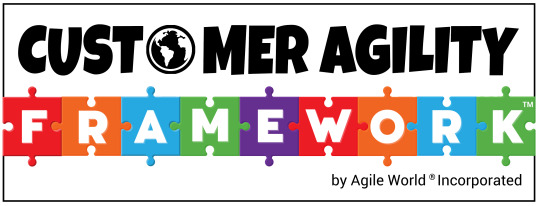
What is Customer Agility ™ Customer Agility ™ is an evolution upon prior understandings of Customer Agility so that the entire organisation is focused on delivering the best possible experience to the end customers as part #AgileWorldInc #AgileTransformation #AgileFinOps #LeanPortfolioManagement https://agile-world.us/what-is-customer-agility/?utm_source=tumblr&utm_medium=%23AgileWorld&utm_campaign=%23AgileWorld
#AgileCertification#AgileWorldInstitute#AgileWorldFramework#BusinessNorthStar#Community#ContinuingProfessionalDevelopment#CustomerAgility#CustomerAgilityFramework#CustomerNorthStar#Insights
0 notes
Text
PMI and Agile Certified Practitioner: A Guide to Project Management Excellence
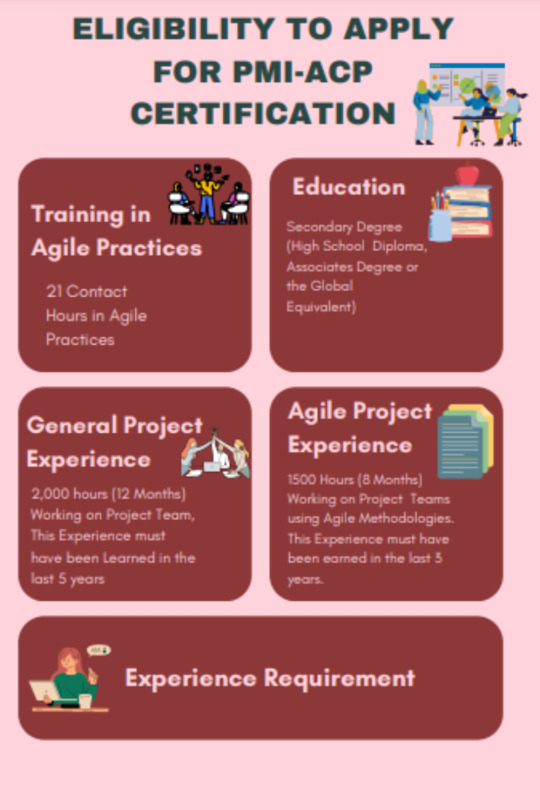
Embark on a transformative journey toward project management excellence by embracing the dual power of PMI and Agile Certified Practitioner certifications. This guide serves as a roadmap, providing valuable insights, practical tips, and a holistic perspective on how these certifications combine to create a project manager ready to tackle the complexities of modern project environments. Elevate your project management career and lead with confidence in an ever-evolving landscape
0 notes